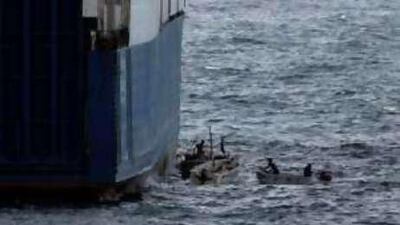UNITED NATIONS // Faced with an escalation of pirate raids off Somalia's coast, the UN Security Council is expected to vote on a draft resolution this week calling for the deployment of military vessels and aircraft to restore order to the lawless waters. Council action comes amid mounting concerns over the security along the key trade route, heightened last week when pirates insisted they would not lower demands for US$20 million (Dh74m) in ransom for the release of a hijacked Ukrainian cargo ship that is loaded with tanks and heavy weapons. A French-drafted resolution read by members of the 15-country body calls for navy and air force chiefs to use "the necessary means" to thwart acts of piracy. It calls on "states interested in the security of maritime activities to take part actively in the fight against piracy on the high seas off the coast of Somalia, in particular by deploying naval vessels and military aircraft, in accordance with international law". The council move comes amid heightened anxiety among merchant seamen who transit the Red Sea's southern bottleneck and adjacent Gulf of Aden, a vital shipping route that links Europe and Asia via the Suez Canal. "The pirates are now attacking ships on a daily basis with machine guns and rocket propelled grenades, and currently holding over 200 seafarers hostage," said a joint statement from the International Transport Workers' Federation and several shipping firms. "The pirates are operating with impunity, and governments stand idly by." The group said the shipping industry transports 90 per cent of global trade and expressed "utter amazement" that the international community cannot safeguard "one of the world's most strategically important seaways". Shipping magnates say they may redirect vessels around Africa's Cape of Good Hope, a move that would add weeks to voyage lengths plus increase cargo costs and fuel consumption. "If civil aircraft were being hijacked on a daily basis, the response of governments would be very different," the statement said. "Yet ships, which are the lifeblood of the global economy, are seemingly out of sight and out of mind." Recent reports from the International Maritime Bureau reveal that emboldened pirates are taking "mother ships" far from Somalia's coastline to launch speedboats and attack targets with rocket propelled grenades. Often dressed in army fatigues, the technology-savvy pirates use satellite navigation systems and carry automatic weapons to raid, steal cargo and kidnap crew members for ransom. More than 60 attacks on ships have been reported off Somalia's coast already this year, but pirates executed what could be their most lucrative raid on Sept 25 with the capture of MV Faina and her cargo of weaponry and 33 combat tanks. The pirates have dropped anchor off the coastal village of Hobyo, 500km north of the capital, Mogadishu, where they are surrounded by vessels of the US navy and other countries as negotiators try to broker a deal. Ahmedou Ould-Abdallah, the UN's envoy to the turbulent Horn of Africa country, likened the hijacking to the illicit trafficking in so-called "blood diamonds" to finance civil wars in West Africa. "There is a striking similarity between the actions of these unscrupulous pirates and the activity in blood diamonds in Liberia and Sierra Leone during the civil wars in these countries," Mr Ould-Abdallah said. "No ship, big or small, industrial or commercial, civil or military is spared. With the seizure of the Ukrainian ship a new line has been crossed. This act should not and will not be rewarded." Piracy has become a multimillion-dollar business that is compounding Somalia's economic woes of rising crude and food costs by increasing insurance and shop prices, added the official. In June, a resolution adopted by the Security Council authorised countries to enter Somalia's territorial waters and use "all necessary means" to stop piracy for a period of six months. After a spate of attacks, the combined naval presence of the United States, Britain, France and Canada established a "buffer zone" on Aug 22 to protect a channel between the edge of Somalia's territorial waters and the shipping lanes off Southern Yemen. The task force advised captains to use the safe passage north of the patrol area, but shipping unions complained that the warships offered little protection and they continued to suffer attacks. The UAE's mission to the UN voices great concern over piracy, estimating that about half the raided vessels are Emirates-flagged dhow boats that brave the perilous waters for trading raw materials with the Horn of Africa. Somalia has been without effective central government for more than 17 years, is plagued by insecurity and has no functioning navy - meaning pirates can act with near impunity in its waters. Most raids occur in the Gulf of Aden, but pirates have recently been targeting Indian Ocean waters off the eastern part of Somalia's 3,000km coastline. France's draft resolution, which does not specify a time limit, expresses grave concern at "the recent proliferation of acts of piracy and armed robbery at sea against vessels off the coast of Somalia". The document notes with concern "that increasingly violent acts of piracy are carried out with heavier weaponry" using mother ships and more sophisticated methods of attack. The draft resolution urges all states and regional organisations to continue taking action to protect UN World Food Programme maritime convoys, which are vital to bring humanitarian assistance to an anticipated 3.5 million needy Somalis. jreinl@thenational.ae

UN's focus hijacked by pirates in Somalia
The UN Security Council is expected to vote on a draft resolution this week calling for the deployment of military vessels and aircraft to restore order to the lawless waters.
Most popular today

